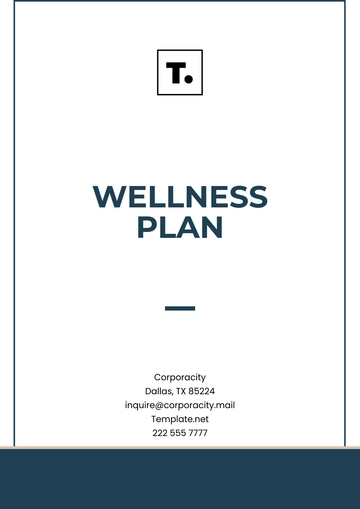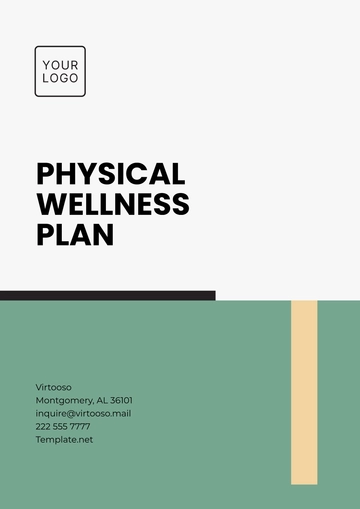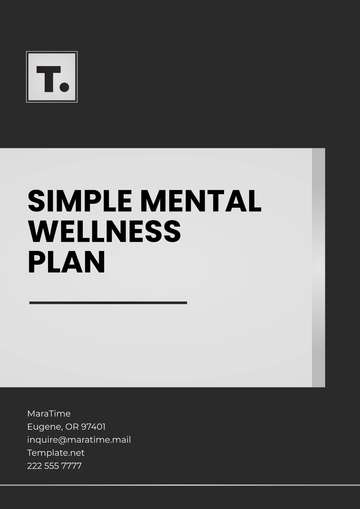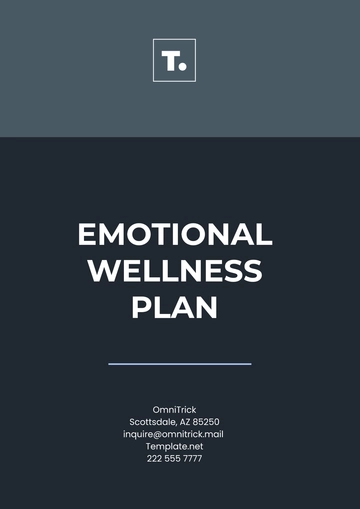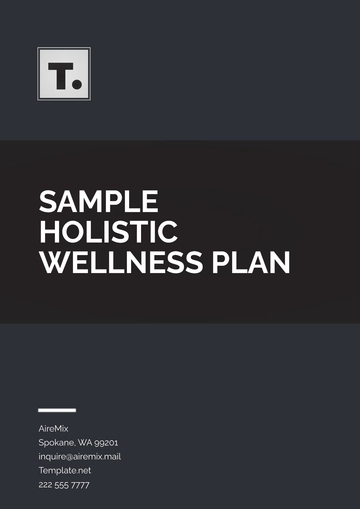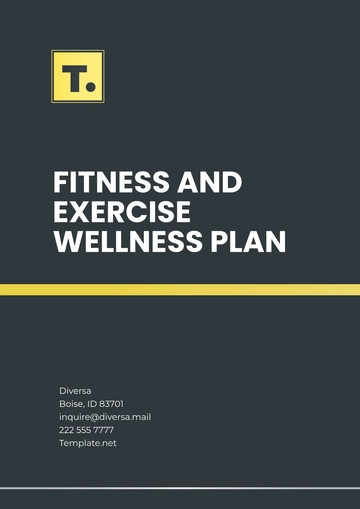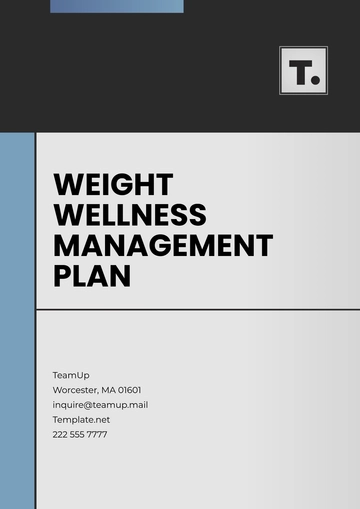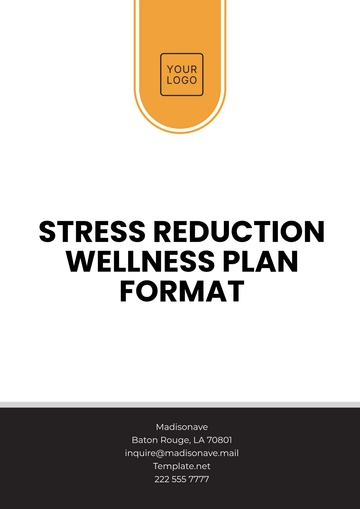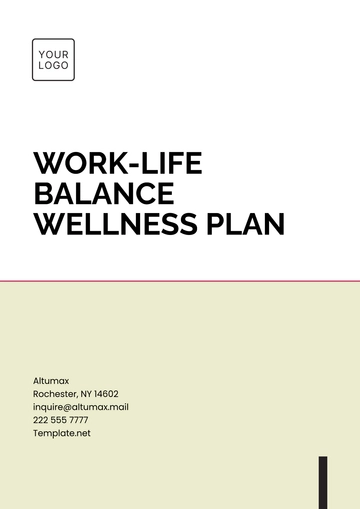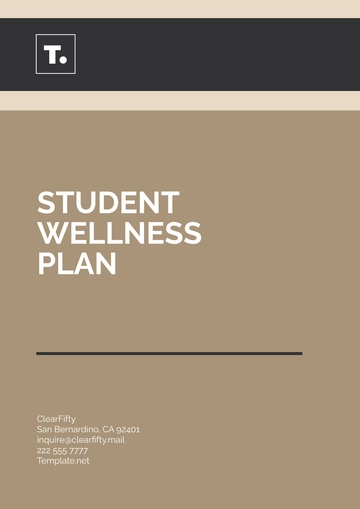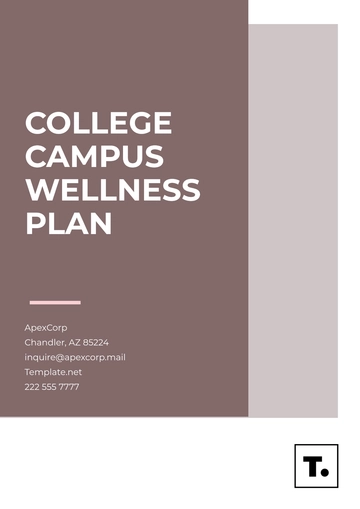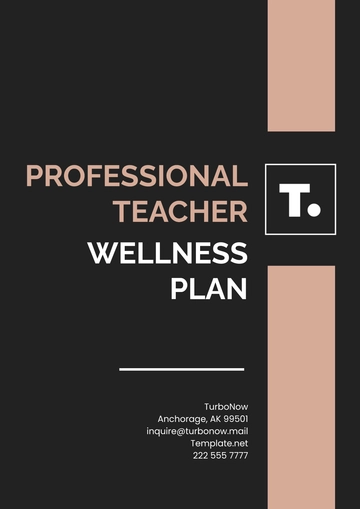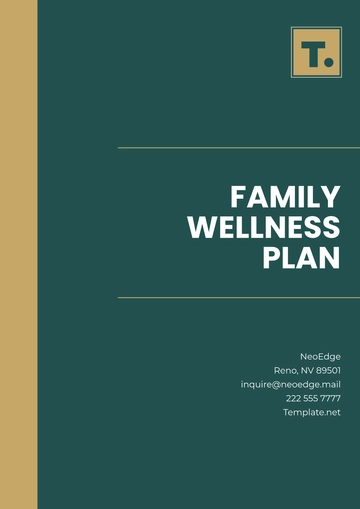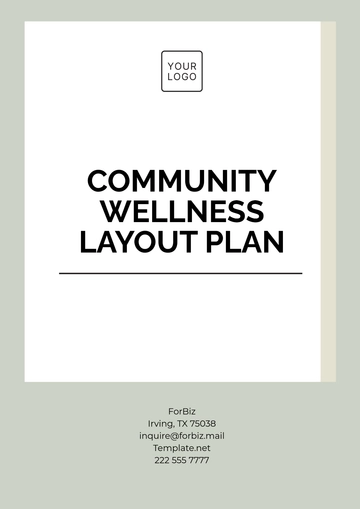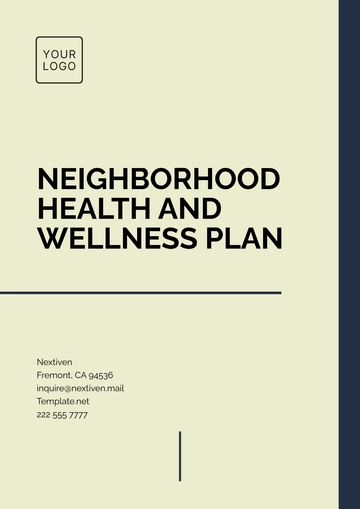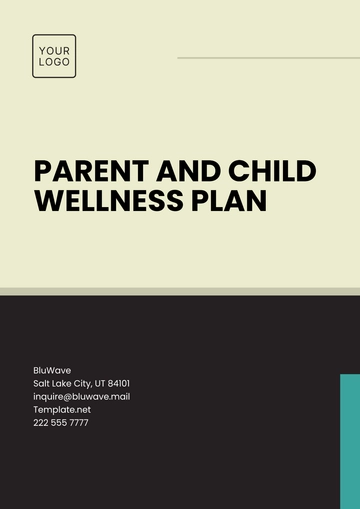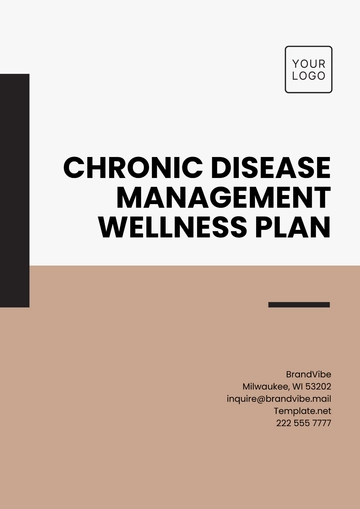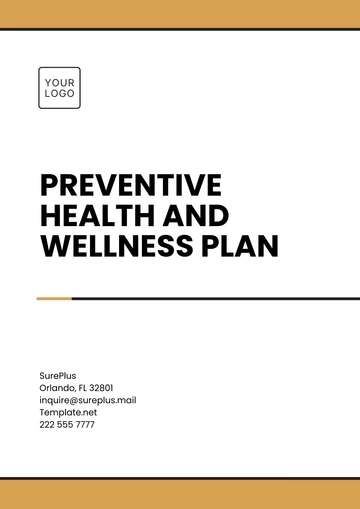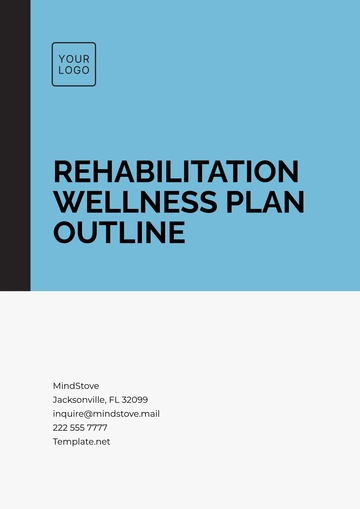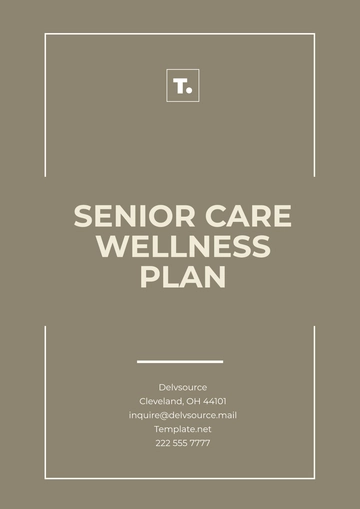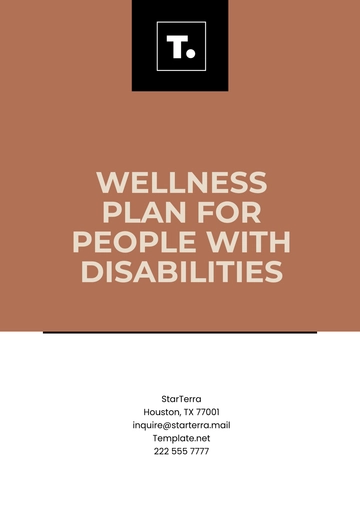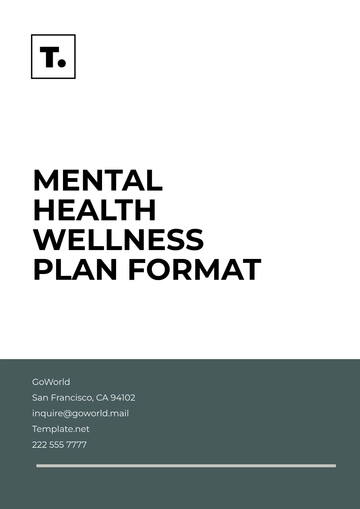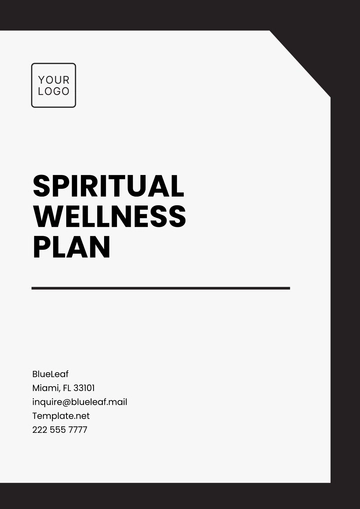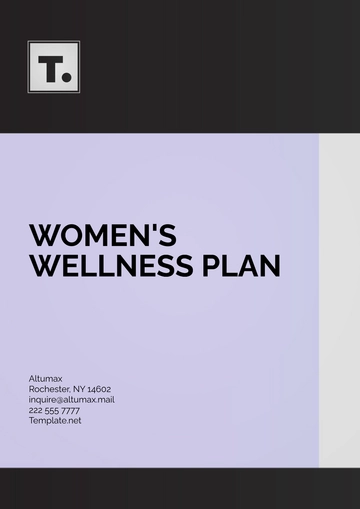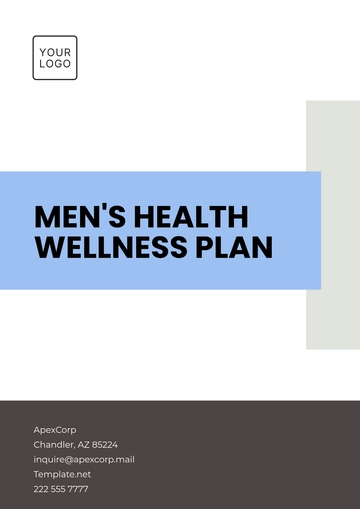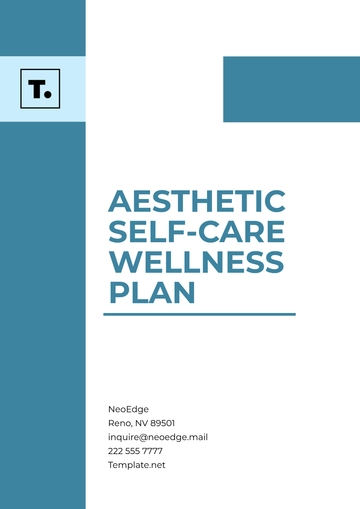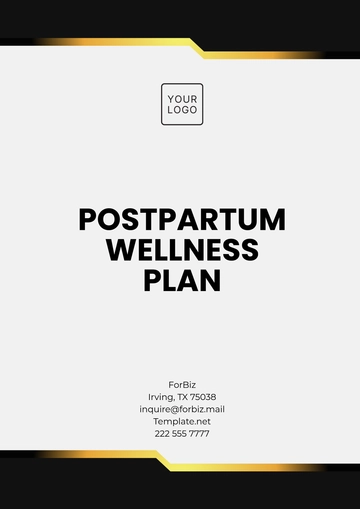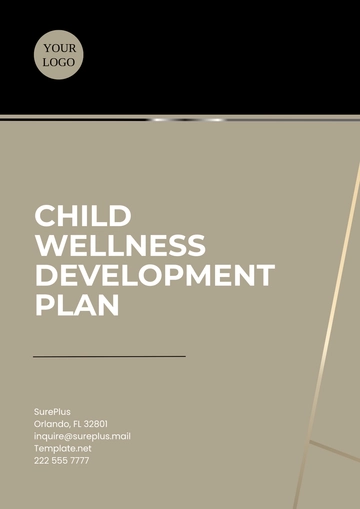Free Weight Wellness Management Plan
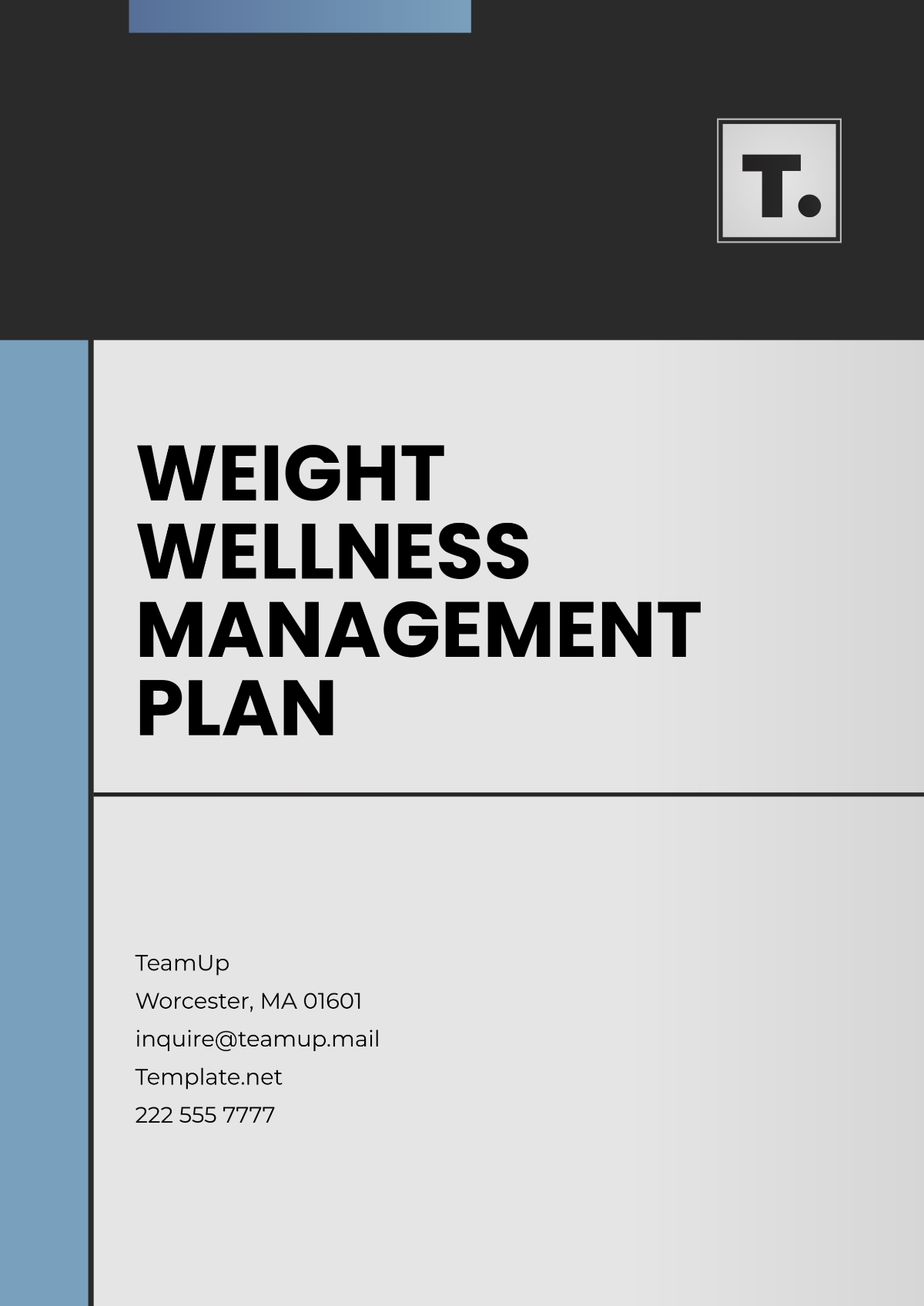
Prepared by: [Your Name]
Company: [Your Company Name]
Date: [Insert Date]
I. Introduction
Maintaining a healthy weight is a fundamental aspect of overall wellness, contributing to both physical and mental well-being. The Weight Wellness Management Plan is designed to guide individuals toward achieving and sustaining a healthy weight through structured strategies, education, and support. By focusing on nutrition, exercise, and mindset, this plan aims to help individuals develop sustainable habits that promote long-term health and wellness.
This comprehensive plan combines effective weight management strategies with emotional support to create a holistic approach to achieving and maintaining a healthy weight, improving quality of life, and preventing weight-related health issues.
II. Vision and Goals
Vision:
To empower individuals to achieve and maintain a healthy weight by providing the tools, resources, and support necessary for sustainable weight management and overall well-being.
Goals:
Support individuals in reaching and maintaining a healthy weight through personalized strategies and sustainable lifestyle changes.
Educate participants on healthy eating habits, physical activity, and the psychological aspects of weight management.
Foster a positive relationship with food and body image, encouraging balanced, long-term approaches to weight wellness.
Promote overall well-being through integrated practices that address nutrition, physical activity, and mental health.
III. Key Areas of Focus and Strategies
1. Nutrition and Healthy Eating
Strategies:
Personalized Nutrition Plans: Work with nutritionists or dietitians to create individualized meal plans that align with participants' health goals, preferences, and medical conditions.
Balanced Meal Education: Provide educational workshops on portion control, healthy meal planning, and the importance of macronutrients (proteins, fats, carbohydrates).
Healthy Eating Resources: Offer easy-to-follow recipes, shopping lists, and cooking classes to encourage participants to prepare nutritious meals at home.
Mindful Eating Practices: Introduce mindfulness techniques to help individuals make conscious decisions about food, listen to their bodies' hunger cues, and prevent overeating.
Healthy Snack Options: Provide nutritious snack options in shared spaces or at workplace events to encourage healthier food choices throughout the day.
2. Physical Activity and Exercise
Strategies:
Customized Exercise Plans: Offer personalized fitness plans tailored to individual fitness levels, goals, and preferences, such as strength training, cardio, or flexibility exercises.
Group Fitness Classes: Organize regular group fitness classes, such as yoga, Pilates, Zumba, or boot camps, to foster a sense of community and accountability.
Active Lifestyle Integration: Encourage participants to integrate physical activity into their daily routines, such as taking the stairs, walking during breaks, or cycling to work.
Physical Activity Challenges: Create monthly or quarterly fitness challenges, such as step competitions, walking or running goals, or exercise streaks, to motivate participants and celebrate progress.
Tracking and Monitoring: Offer fitness tracking tools (e.g., pedometers, apps, or wearables) to help individuals monitor their physical activity levels, set achievable goals, and track progress over time.
3. Mindset and Emotional Wellness
Strategies:
Emotional Eating Awareness: Provide education and support to help participants recognize triggers for emotional eating and develop healthier coping mechanisms.
Positive Body Image Promotion: Offer workshops on self-compassion, body positivity, and improving body image to foster a healthier relationship with one's body.
Stress Management: Integrate stress management techniques into the plan, such as mindfulness, deep breathing exercises, and relaxation practices, to reduce emotional eating and support overall mental health.
Behavioral Coaching: Provide access to professional coaching or counseling to help individuals overcome psychological barriers to weight management and develop sustainable habits.
Community Support Groups: Create peer support groups or buddy systems where participants can share their experiences, challenges, and victories, offering encouragement and accountability.
4. Education and Resources
Strategies:
Workshops and Seminars: Host monthly workshops or webinars covering topics such as healthy eating, exercise routines, overcoming weight loss plateaus, and understanding metabolism.
Educational Materials: Provide participants with educational booklets, articles, and online resources on nutrition, exercise, and mental health to enhance their knowledge.
Access to Expert Advice: Offer ongoing consultations with nutritionists, fitness trainers, or wellness coaches for personalized guidance and advice.
Weight Wellness App: Develop or partner with a mobile app that offers meal tracking, fitness tracking, progress monitoring, and community support to help individuals stay on track with their goals.
5. Long-Term Sustainability
Strategies:
Goal Setting and Progress Tracking: Encourage participants to set short-term and long-term goals, track their progress, and celebrate milestones to maintain motivation.
Healthy Habit Formation: Focus on helping individuals establish sustainable, long-term habits by encouraging gradual lifestyle changes rather than quick fixes or extreme dieting.
Regular Check-Ins: Implement periodic check-ins (monthly or quarterly) to assess progress, address challenges, and adjust strategies as needed.
Ongoing Support: Provide continuous support through online communities, follow-up consultations, and ongoing access to resources to ensure long-term success.
IV. Implementation Plan
Roles and Responsibilities:
Wellness Committee: Oversee the planning, coordination, and evaluation of weight wellness programs and initiatives.
Health Coaches and Experts: Provide guidance, create personalized nutrition and fitness plans, and lead workshops and seminars.
Participants: Actively engage in the program by following personalized plans, attending workshops, and providing feedback on progress.
Leadership Team: Support and fund the implementation of weight wellness initiatives, ensuring that resources and opportunities are provided to all participants.
Timeline:
Phase 1 (Month 1–3): Program launch, including needs assessment, individual consultations, and educational workshops on nutrition, exercise, and mindset.
Phase 2 (Month 4–6): Launch group fitness classes, tracking tools, and behavioral wellness resources. Monitor progress and provide additional support.
Phase 3 (Month 7–12): Expand program offerings, including new challenges, workshops, and peer support systems. Evaluate progress, make adjustments, and continue to provide resources.
V. Measurement and Evaluation
Key Performance Indicators (KPIs):
Weight Loss/Weight Maintenance: Track the percentage of participants who achieve their weight goals or maintain a healthy weight over time.
Participant Engagement: Measure the number of participants attending workshops, and group classes, and utilizing fitness tracking tools.
Health and Fitness Improvements: Monitor improvements in physical health metrics, such as body composition, energy levels, and fitness assessments.
Satisfaction and Feedback: Gather participant feedback through surveys or focus groups to assess program satisfaction, areas for improvement, and long-term impact.
Evaluation Methods:
Monthly progress reports and check-ins with participants to track weight and fitness progress.
Annual program evaluation to assess overall effectiveness, challenges, and achievements.
Participant surveys to measure satisfaction with the program and identify areas for improvement.
VI. Sustainability Plan
Continuous Funding: Secure funding through partnerships, sponsorships, or internal resources to sustain the weight wellness initiatives long-term.
Ongoing Education: Keep participants engaged and informed with regular updates on new nutrition trends, fitness techniques, and mental wellness strategies.
Community Engagement: Foster a strong sense of community through support groups, peer mentorship, and continuous involvement in program activities.
Adaptive Programs: Continuously assess participant needs and feedback to adapt programs, ensuring relevance and effectiveness as participants’ needs evolve.
VII. Conclusion
The Weight Wellness Management Plan is designed to provide a comprehensive, sustainable approach to achieving and maintaining a healthy weight. By addressing key aspects of nutrition, physical activity, emotional wellness, and long-term habit formation, this plan aims to create a supportive environment where individuals can thrive and achieve their weight wellness goals. Through continuous education, support, and personalized strategies, we will foster a culture of well-being that empowers participants to prioritize their health and achieve lasting success.
- 100% Customizable, free editor
- Access 1 Million+ Templates, photo’s & graphics
- Download or share as a template
- Click and replace photos, graphics, text, backgrounds
- Resize, crop, AI write & more
- Access advanced editor
You may also like
- Finance Plan
- Construction Plan
- Sales Plan
- Development Plan
- Career Plan
- Budget Plan
- HR Plan
- Education Plan
- Transition Plan
- Work Plan
- Training Plan
- Communication Plan
- Operation Plan
- Health And Safety Plan
- Strategy Plan
- Professional Development Plan
- Advertising Plan
- Risk Management Plan
- Restaurant Plan
- School Plan
- Nursing Home Patient Care Plan
- Nursing Care Plan
- Plan Event
- Startup Plan
- Social Media Plan
- Staffing Plan
- Annual Plan
- Content Plan
- Payment Plan
- Implementation Plan
- Hotel Plan
- Workout Plan
- Accounting Plan
- Campaign Plan
- Essay Plan
- 30 60 90 Day Plan
- Research Plan
- Recruitment Plan
- 90 Day Plan
- Quarterly Plan
- Emergency Plan
- 5 Year Plan
- Gym Plan
- Personal Plan
- IT and Software Plan
- Treatment Plan
- Real Estate Plan
- Law Firm Plan
- Healthcare Plan
- Improvement Plan
- Media Plan
- 5 Year Business Plan
- Learning Plan
- Marketing Campaign Plan
- Travel Agency Plan
- Cleaning Services Plan
- Interior Design Plan
- Performance Plan
- PR Plan
- Birth Plan
- Life Plan
- SEO Plan
- Disaster Recovery Plan
- Continuity Plan
- Launch Plan
- Legal Plan
- Behavior Plan
- Performance Improvement Plan
- Salon Plan
- Security Plan
- Security Management Plan
- Employee Development Plan
- Quality Plan
- Service Improvement Plan
- Growth Plan
- Incident Response Plan
- Basketball Plan
- Emergency Action Plan
- Product Launch Plan
- Spa Plan
- Employee Training Plan
- Data Analysis Plan
- Employee Action Plan
- Territory Plan
- Audit Plan
- Classroom Plan
- Activity Plan
- Parenting Plan
- Care Plan
- Project Execution Plan
- Exercise Plan
- Internship Plan
- Software Development Plan
- Continuous Improvement Plan
- Leave Plan
- 90 Day Sales Plan
- Advertising Agency Plan
- Employee Transition Plan
- Smart Action Plan
- Workplace Safety Plan
- Behavior Change Plan
- Contingency Plan
- Continuity of Operations Plan
- Health Plan
- Quality Control Plan
- Self Plan
- Sports Development Plan
- Change Management Plan
- Ecommerce Plan
- Personal Financial Plan
- Process Improvement Plan
- 30-60-90 Day Sales Plan
- Crisis Management Plan
- Engagement Plan
- Execution Plan
- Pandemic Plan
- Quality Assurance Plan
- Service Continuity Plan
- Agile Project Plan
- Fundraising Plan
- Job Transition Plan
- Asset Maintenance Plan
- Maintenance Plan
- Software Test Plan
- Staff Training and Development Plan
- 3 Year Plan
- Brand Activation Plan
- Release Plan
- Resource Plan
- Risk Mitigation Plan
- Teacher Plan
- 30 60 90 Day Plan for New Manager
- Food Safety Plan
- Food Truck Plan
- Hiring Plan
- Quality Management Plan
- Wellness Plan
- Behavior Intervention Plan
- Bonus Plan
- Investment Plan
- Maternity Leave Plan
- Pandemic Response Plan
- Succession Planning
- Coaching Plan
- Configuration Management Plan
- Remote Work Plan
- Self Care Plan
- Teaching Plan
- 100-Day Plan
- HACCP Plan
- Student Plan
- Sustainability Plan
- 30 60 90 Day Plan for Interview
- Access Plan
- Site Specific Safety Plan
